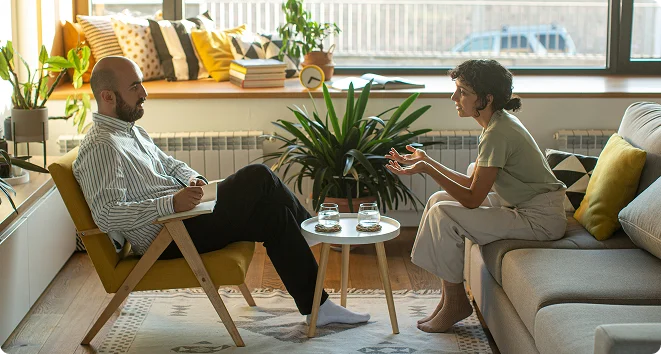Individual and Group Therapy in CO
Therapy can give you the tools to handle life’s challenges with more confidence and clarity. At Drift Behavioral Health, we offer individual and group therapy to support healing, growth, and emotional well-being.

Understanding Therapy
Many people struggle with their mental health, and therapy can make a huge difference. According to the CDC, over 1 in 5 adults in the US live with a mental illness, and talking to a therapist is a proven way to feel better and live more fully.
What Is Therapy and How Does It Help?
Therapy is an opportunity to talk things through with someone trained to listen, guide, and make sense of what you’re feeling. It helps manage stress, improve relationships, and navigate things like anxiety, trauma, or major life changes.
Did you know? “Counseling” and “therapy” usually mean the same thing. Both involve meeting with a mental health professional to work through what’s on your mind and find healthier ways to cope.
Talk therapy is only one factor in the healing process. At Drift, we also use more creative and holistic options. These include art, music, outdoor activities, yoga, and meditation, supporting healing in alternative ways.
Individual Therapy vs. Group Therapy
No two people are exactly alike, and the same goes for therapy. Some people open up best one-on-one, while others find strength in shared experiences. At Drift, we offer both, so you can choose what works best for you.
Individual Therapy and Counseling
Individual therapy is a private space where you can explore what’s going on with a licensed therapist. It’s especially helpful for working through things like depression, anxiety, trauma, grief, or relationship stress.
Benefits of Individual Therapy
- Focused, one-on-one support
- A private, judgment-free space
- Time to dig into specific challenges
- Stronger connection with your therapist
- Total confidentiality
- A clearer picture of your progress over time
What to Expect From an Individual Therapy Session
Sessions usually last around 50 minutes. You’ll have an open conversation with your therapist, explore what you’re going through, and learn practical tools to help you feel more in control.
Group Therapy and Counseling
In group therapy, a small group meets with a licensed therapist to talk, listen, and learn from each other. It’s a space where you can feel less alone and build confidence by connecting with others who get what you’re going through.
Benefits of Group Therapy
- Helps you feel less isolated
- A chance to practice communication skills
- Feedback from people who relate
- A sense of belonging
- New ways of thinking about your situation
- Encouragement from a supportive group
What to Expect From a Group Therapy Session
Group sessions usually last about an hour and follow a clear structure. Your therapist will guide the conversation, and you’ll take part in group discussions, shared activities, or skills-based exercises.
Family Therapy
Family therapy helps everyone in the home feel heard and work better together. It’s great for improving communication, resolving conflict, and supporting a loved one’s recovery or mental health journey.
Group Therapy vs. Support Groups
Group therapy is run by a licensed therapist and follows a clear plan. Support groups are more casual and peer-led. Both offer support; you just get something a little different from each.
Our Approach to Mental Health Counseling and Treatment
At Drift, we believe therapy should feel personal, not one-size-fits-all. We take a trauma-informed approach and use evidence-based treatments tailored to you. With flexible scheduling, virtual options, transportation support, and aftercare planning, we make getting help feel easier.

Types of Therapy We Offer
We offer a wide range of therapy options to fit your needs. Each one is backed by research and delivered with compassion by experienced professionals.
Cognitive-Behavioral Therapy (CBT)
CBT helps you change unhelpful thoughts and build better habits.
Dialectical Behavior Therapy (DBT)
DBT teaches skills for managing emotions, staying present, and handling relationships.
Psychotherapy
A space to talk through past experiences and start healing emotional pain.
Motivational Interviewing
This short-term therapy helps you get clear about your goals and what’s holding you back.
Narrative Therapy
It helps you reframe your life story and take back control of your personal narrative.
Interpersonal Therapy
Focuses on your relationships and how they shape your emotional well-being.
Emotion-Focused Therapy
Helps you better recognize, understand, and respond to your emotions.
Internal Family Systems Therapy
Looks at different “parts” of you to ease inner tension and improve self-understanding.
Mindfulness-Based Therapy
Uses mindfulness techniques to help you stay calm, present, and grounded.
Recreational and Experiential Therapies
Creative and movement-based therapies, like art, music, yoga, and nature-based activities.
Our Behavioral Services and Outpatient Therapy Programs
Drift offers in-person services in Colorado Springs and virtual care across the state. We also help with inpatient placement when needed. From transportation support to a welcoming, skill-building community, we’re here to meet you where you are and help therapy fit into your life. We accept all major insurance providers to keep your care accessible and stress-free.
Psychiatric Evaluations
Our licensed clinicians assess your symptoms and help you get a diagnosis.
Integrated care that treats mental health conditions and substance use together.
Support with medications like antidepressants, Suboxone, Sublocade, Naltrexone, or Vivitrol.
A full-day program, 5 to 6 days a week, with therapy, skill-building, and holistic care.
A flexible treatment program, 3 to 5 days a week, that fits into your life.
Get care from home through secure Zoom sessions, with the same level of support.
Make a Therapy Appointment at Drift Behavioral Health Today
You don’t have to carry everything on your own. At Drift Behavioral Health, we’ll meet you where you are and help you take that next step with support, compassion, and care that fits your life. Reach out today to book your first session and start feeling more like yourself again.
Common Questions About Psychiatric Evaluations
Psychotherapy vs. therapy: What’s the difference?
They mean the same thing. Both involve working with a mental health professional to improve your well-being.
What is cognitive-behavioral therapy?
CBT helps you notice and change negative thought patterns that affect how you feel and act.
How do you find a therapist?
Reach out to Drift, and we’ll walk you through the options and help you get started.
What kind of therapist do I need?
It depends on what you need support with right now. We’ll help match you with someone trained in your specific concerns.
Is individual therapy better than group therapy?
There’s no one-size-fits-all answer. Some people prefer one-on-one time, while others grow more in a group setting.
What is Gestalt therapy?
It’s a type of therapy that helps you become more aware of your feelings and actions in the present moment.
Do you offer grief counseling?
Yes, we do. Our therapists help you work through grief in a way that feels supportive and healing.
Latest Resources
Tramadol is often prescribed for pain, but the way it works is more complicated than most people expect. Research shows the benefits are modest, while the risks of side effects
Every October 10th, World Mental Health Day reminds us to care for our emotional well-being. Mental health awareness keeps growing, yet millions of people still face stigma that stops them
If you’re thinking about quitting smoking or just curious about what’s going on inside your body, understanding how long nicotine lingers is important. Reasons can vary, whether you need to
Contact Us
Contact Us
"*" indicates required fields


